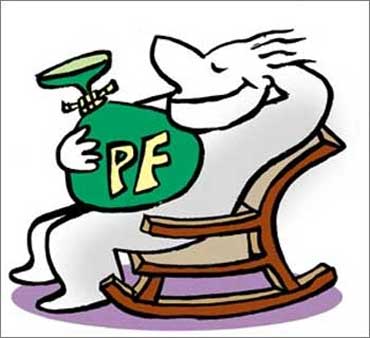Photographs: Rediff Archives Anil Rego
For all of us, there would have been stituations in the past where one went scurrying from pillar to post in order to collect funds needed to meet an emergency. These are the situations that one should plan for or these are the contingent needs that one does not anticipate. Being ready to meet a financial emergency is an integral part of financial planning but is often ignored.
Emergency fund
An emergency fund helps you deal with unexpected expenditures without adding more to the existing trauma of dealing with an emergency situation. This fund should be an easily accessible stash of money to be used only in case of an emergency. Establishing an emergency savings account is vital in good times and in bad. Emergency need not always spell bad news; it could also mean a sudden visit by friends / relatives, wherein you would be required to stretch beyond your budget. The success of any long-term emergency fund creation depends less on the rate of return and more on consistently putting money away and leaving it there.
Here's why you must have an emergency fund
Photographs: Rediff Archives
Need for an emergency fund
You may have already encountered numerous situations that could be categorised as 'emergency'. Here are a few common instances:
- Health related
- Accidents
- Additional expenses for unexpected guests
- Loss of job / Job transition
- Poor business cycle for self-employed
- Machinery breakdown, home-related overhaul etc.
Here's why you must have an emergency fund
Photographs: Rediff Archives
Building the corpus
How much is enough is a question that no one has a definite answer to. Most often, it is assessed that one should maintain atleast three months of household expenses in highly liquid instruments such as savings bank balance, flexi-fixed deposit etc. It would be beneficial to have an additional three months' liquidity in debt mutual funds such as liquid plus, floating rate funds etc and a final set of liquidity should be held in equity mutual funds (this however, can be a substantial amount that can be ear-marked to any other financial goal).
The corpus of emergency fund needs to be tailored to one's circumstances because the riskiness of the situation is determined by the circumstances of one's life -- there is no thumb rule which will help you determine this.
Dipping into corpus ear-marked for financial goals
This is definitely the last option that you should consider. If you are required to dip in for some reason, then remember to replenish it at the earliest. Failure to do so will spiral and could create a much bigger dent in your financial planning initiatives, the next time around an emergency comes calling.
Let us say, you withdrew Rs 5 lakh for an emergency payment and did not replenish it, the possible dent in the corpus as regards your financial planning could be as below:

It is best to replenish these funds with a 2 to 3 year horizon and by increasing your monthly contribution into funds. You could also consider a slightly higher risk appetite to bridge this gap.
Here's why you must have an emergency fund
Photographs: Rediff Archives
Using Provident Fund
Often individuals never give too much thought to the diversification aspect. In their wayward and haphazardness towards tax saving, they end up laying out substantial funds into EPF (Employee Provident Fund) / VPF (Voluntary Provident Fund) / PPF (Public Provident Fund). This pretty much becomes the major chunk of their savings / investment and during emergencies an individual is left with little choice but to dip into this. The only other alternate they would conceive is using their credit card and or availing personal loans (both of which could possibly lead to a debt trap).
One can make partial withdrawal from the EPF account, however if such withdrawal is made within 5 years' of continuous employment, it becomes taxable, unless the individual proves that such withdrawal is towards purchase of house, daughter's wedding or due to one's own unemployment due to ill-health. One also has the option of availing a loan against EPF.
The term of a PPF account is typically 15 years. One can increase the term thereon in blocks of 5 years up to 30 years. Withdrawals are however, allowed only from the seventh year. The investor can make one withdrawal every year from the seventh year, subject to a formula -- roughly 50% of the PPF balance three years prior to the date of withdrawal. Here again, one can borrow against the PPF from the third financial year of opening the account. You are permitted to borrow upto 25% of the PPF balance two years before the withdrawal.
Such withdrawals are to be repaid within 24 months. Rate of interest charged on the loan would be 2% more than the PPF interest rate prevailing then. A second loan could be availed as long as you are within the third and the sixth year, and only if the first one is fully repaid. Also note that once you become eligible for withdrawals, no loans would be permitted. Inactive accounts or discontinued accounts are not eligible for loan.
In the long term, the emergency fund would need lower or no contribution, it would primarily be about maintaining the planned funds. Either way, it is time you gave a thought to and planned for the unexpected!





Comment
article